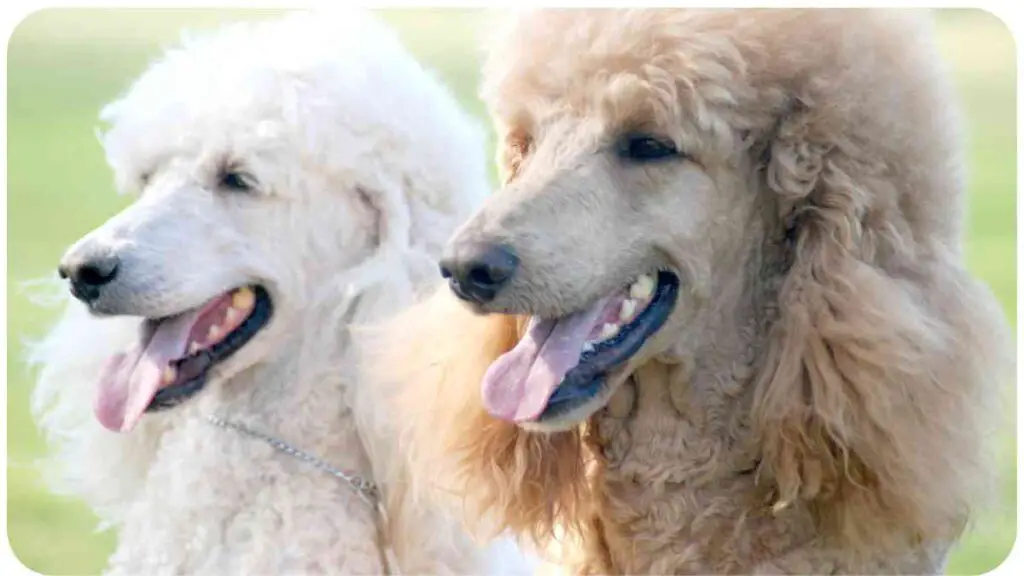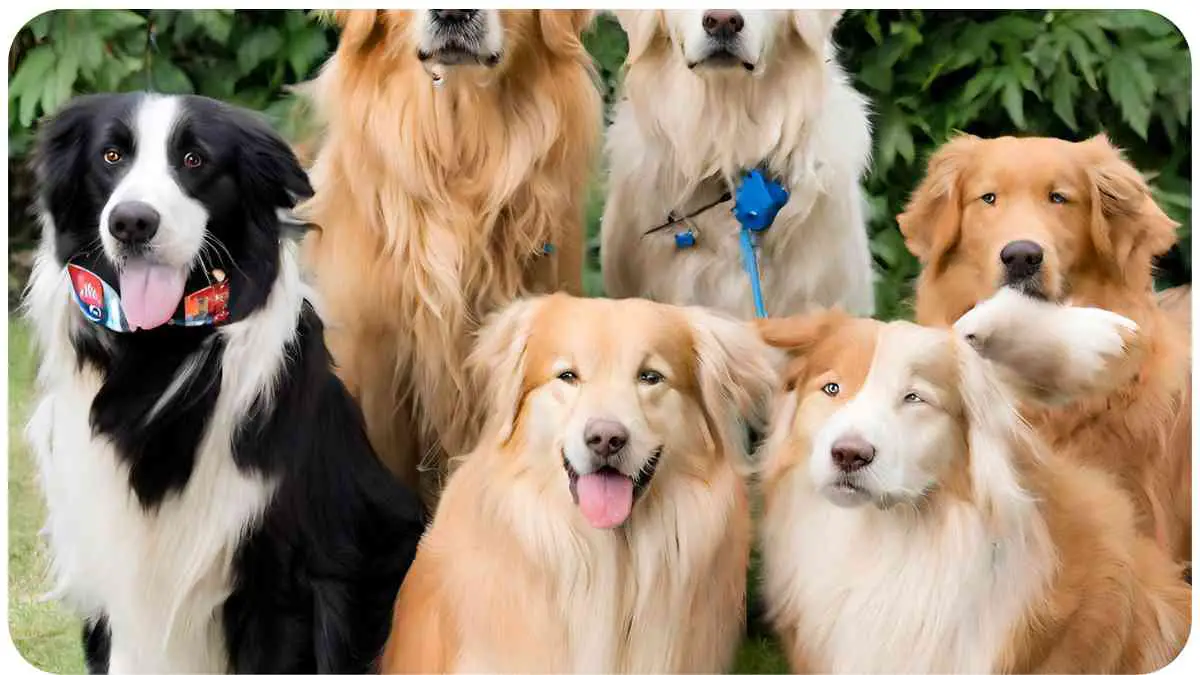Golden Retrievers are among the most affable, gentle, and friendly breeds out there. Their loving disposition, coupled with their intelligence and beauty, makes them a top choice for families worldwide. Yet, like every social being, they often seek the companionship of their kind.
| Takeaways |
|---|
| Understand the importance of breed compatibility when finding a companion for your Golden Retriever. |
| Neutral environments are key for smooth introductions between dogs. |
| Shared activities like group training and joint adventures can foster a strong bond between canine companions. |
| Address and mitigate potential challenges such as personality clashes and territorial behaviors with patience and understanding. |
| Regular vet visits and tailored diets are essential for maintaining the health of both dogs. |
| Be prepared with solutions and strategies for unexpected situations or challenges. |
| Utilize resources and insights from the canine community to ensure a harmonious bond between your Golden Retriever and its new companion. |
Understanding the Golden Retriever’s Nature

Golden Retrievers are innately social creatures. Originating as hunting dogs, they worked closely with other dogs and humans, relying on teamwork. This background has embedded a desire for companionship deep within their genetic code. But how does one determine the best companion for such a friendly giant?
Ever watched two Golden Retrievers play in a park? Their camaraderie, mutual respect, and joy are palpable. I’ve seen this firsthand when my own Golden, Charlie, interacts with other dogs.
Table: Quick Facts About Golden Retrievers
| Trait | Information |
| Lifespan | 10-12 years |
| Temperament | Friendly, Intelligent, Reliable |
| Size | Large |
| Activity Level | High |
| Known for | Soft mouths and love for retrieving games |
The Need for a Companion Dog
Golden Retrievers, with their boundless energy and affability, often thrive in the company of another dog. Whether it’s for play, mutual grooming, or simply lounging around, having another canine buddy can be beneficial.
New dog owners often wonder, Are Golden Retrievers Good for Beginners? These friendly and adaptable dogs are indeed a perfect match for first-time pet parents, known for their gentle temperament and easygoing nature. They bring joy to households with their loving companionship.
Why Golden Retrievers Thrive with Companions
It’s not just about play. A companion can also provide a sense of security, help in socializing, and even contribute to mental stimulation.
Remember the time when Charlie was left alone during a family vacation? He missed the company so much that when we returned, he was over the moon to see another dog at the park. It was a heartwarming reminder of their need for companionship.
Table: Benefits of Having a Companion Dog
| Benefit | Explanation |
| Emotional Support | Reduces feelings of loneliness and anxiety. |
| Physical Activity | Playtimes double, ensuring more exercise. |
| Socialization | Helps in adapting to different dogs and environments. |
| Mental Stimulation | Interactive games, problem-solving, and more. |
Characteristics of an Ideal Companion
When thinking about introducing a new furry member to the family, it’s essential to consider a few traits to ensure both dogs live harmoniously.
Size and Strength Compatibility
Golden Retrievers are large dogs, and while they are gentle, their play can be boisterous. Ensuring that their companion can match their play intensity without getting hurt is crucial.
Personality and Temperament
While Goldens are friendly, not every dog might be a good match. It’s vital to find a dog with a complementary temperament.
When introducing Bella, a spirited Beagle, to Charlie, it was their matching energy levels and playful natures that made their bond instantaneous. While size differed, their souls were in sync.
Top Companion Dog Breeds for Golden Retrievers
Choosing the right companion breed for your Golden Retriever is pivotal. While every individual dog’s temperament varies, certain breeds naturally sync better with the amiable nature of Goldens.
Many pet owners seek to know, Are Golden Retrievers Good Guard Dogs? While not fierce guard dogs, their loyalty and protective instincts make them excellent family protectors. Learn from firsthand experiences how these Retrievers balance their friendly demeanor with a watchful eye
Labrador Retrievers
Labradors, much like their Golden counterparts, are friendly, energetic, and enjoy playtimes. Their similar sizes and temperaments often lead to an instant connection.
I recall a sunny day at the beach when Charlie first met Max, a jovial Labrador. Their shared love for water games made them inseparable companions for the day.
Poodles

Whether it’s a Standard Poodle or a Miniature one, Poodles are known for their intelligence and friendly demeanor. Their hypoallergenic coat is an added advantage for families with allergies.
Border Collies

These highly intelligent and agile dogs can make excellent companions for Goldens. Their shared love for fetch and games can lead to hours of entertainment.
Are you curious about whether Golden Retrievers are easy to train? Discover how their intelligence and eagerness to please make them ideal candidates for obedience training. A professional dog trainer provides insights into the training potential of these lovable companions.
Beagles

Though smaller, Beagles pack a punch of energy. Their curious and friendly nature can be a perfect match for the outgoing Golden.
Table: Comparison of Top Companion Breeds for Golden Retrievers
| Breed | Size | Temperament | Common Interests |
| Labrador | Large | Friendly, Playful, Outgoing | Fetch, Swimming, Running |
| Poodle | Medium | Intelligent, Active, Sociable | Agility, Puzzles, Fetch |
| Border Collie | Medium | Energetic, Intelligent, Playful | Agility, Herding, Fetch games |
| Beagle | Small | Curious, Friendly, Playful | Exploring, Scent games, Chase |
Factors to Consider When Introducing Dogs
Bringing a new dog home isn’t just about picking the breed. The introduction and initial interactions play a pivotal role in setting the tone for their relationship.
Importance of a Proper Introduction
Ensure that the first meeting is in a neutral space, like a park, where neither dog feels territorially threatened. This encourages a relaxed interaction.
When we introduced Charlie to Bella, we chose a local park. Their first sniff and tail wag set the foundation for their budding friendship.
Age and Gender Considerations
While age isn’t always a barrier, puppies or older dogs might have different energy levels compared to young adult Golden Retrievers. Similarly, gender can play a role, with some advocating for opposite-gender pairings to minimize conflicts.
Delve into the topic of Golden Retrievers being double-coated dogs. The dense, water-resistant coat is a hallmark of this breed. A vet answers your questions about their coat and how to care for it, ensuring your Golden Retriever stays healthy and comfortable
Training Tips for Harmonious Living
Once both dogs are home, training and setting boundaries ensure a peaceful coexistence.
The Role of Obedience Training
Both dogs should be trained in basic commands like “sit,” “stay,” and “leave.” This helps in managing their interactions and preventing potential squabbles.
Establishing Boundaries
Defining their personal spaces, toys, and even feeding areas can prevent resource guarding or territorial behaviors.
A lesson we learned the hard way was when both Charlie and Bella wanted the same toy. Setting aside separate toys and teaching them to share was a game-changer.
Benefits of Dog Companionship
Enhanced Mental Well-being
With a buddy around, dogs often exhibit reduced signs of anxiety, depression, or boredom. The constant interaction keeps their minds active.
Physical Advantages for Both Dogs
Two dogs playing together ensure they get ample exercise, even when you might not have the time for a long walk.
Pet expenses vary, and some wonder, Are Golden Retrievers expensive to maintain? Owners share their experiences with the costs associated with these beautiful dogs. From grooming to healthcare, get a comprehensive understanding of what it takes to care for a Golden Retriever.
Table: Physical and Mental Benefits of Dog Companionship
| Benefit Type | Advantages |
| Mental | Reduced Anxiety, Improved Stimulation, Less Boredom |
| Physical | Increased Exercise, Better Muscle Tone, Improved Agility |
Potential Challenges and How to Overcome Them
While the idea of two dogs bonding seamlessly is heartwarming, it’s vital to remember that challenges can arise. Being prepared can make the transition smoother.
Personality Clashes
Just like humans, dogs too can have personality differences. One might be dominant, while the other is submissive, or both might vie for dominance.
In my professional journey, I came across Jack and Jill, two retrievers with dominant streaks. It was a balancing act, ensuring both had their leadership moments.
Marking Territory and Sharing Space
New introductions can lead to territorial behaviors. This can manifest in the form of marking or even guarding certain spaces.
Table: Solutions to Common Challenges
| Challenge | Solution |
| Personality Clashes | Supervise initial interactions, establish a dominance order if necessary, seek professional help when needed. |
| Marking Territory | Clean marked areas with enzyme cleaners, establish personal spaces, use positive reinforcement. |
Case Study: My Experience with Golden Retrievers and Companions
Through my professional journey, I’ve seen numerous Golden Retrievers interact with potential companions. But one story remains etched in my memory.
Anecdote: When Charlie Met Bella
Bella, a vivacious Beagle, entered our life when Charlie was three. While Bella was all about sniffing and chasing, Charlie was into fetch. Their first meeting wasn’t smooth. Bella, in her typical Beagle fashion, was more interested in scents, while Charlie wanted to play.
However, with time and patience, they found common ground. Their morning routines comprised Bella chasing birds while Charlie tried fetching them. It was a sight to behold – two different breeds finding harmony in their differences.
Lessons Learned and Tips for Success
- Patience is Key: Allow them to take their time to adjust. Rushing can lead to increased anxiety.
- Celebrate Small Wins: Every positive interaction, no matter how small, is a step forward.
- Consistent Supervision: Until you’re sure of their bond, always supervise their interactions.
The Importance of Socialization
Introducing dogs to a variety of experiences, environments, and other animals during their early stages is pivotal. It helps in reducing anxiety and ensuring they’re well-rounded.
Early Puppyhood Experiences
Exposing puppies to different sounds, sights, and smells can make them more adaptable. Regular playdates, visits to the dog park, or even car rides can make a difference.
Introducing Dogs to Other Animals
If you have other pets, like cats or birds, introductions should be gradual and supervised.
When Charlie first met our pet parrot, Kiwi, he was puzzled. But with gentle introductions, they now coexist peacefully, albeit with a curious distance.
Safety First: Health and Wellness Considerations
With two dogs, regular vet visits become even more crucial. It’s essential to ensure both are in good health to prevent any disease spread.
Regular Vet Visits
Yearly check-ups, vaccinations, and timely deworming are a must. Regular health screenings can catch potential issues early.
Diet and Nutrition
While Golden Retrievers have specific dietary needs, your companion dog might have different requirements. Ensuring both get a balanced diet tailored to their needs is pivotal.
Bella, with her smaller size, requires fewer calories than Charlie. Keeping their meals separate ensures they get the right nutrition without overeating.
Activities to Strengthen the Bond
Once you have both dogs at home, it’s crucial to engage in activities that foster their bond. This not only helps in building their relationship but also provides mental and physical stimulation.
Group Training Sessions
Joint training sessions can be a fun way for them to learn while interacting. Simple commands or even agility drills can be both entertaining and rewarding.
One of the highlights of my days is watching Charlie and Bella compete in a friendly ‘sit’ challenge. It’s playful competition at its best!
Joint Walks and Adventures
Taking both dogs for walks or hikes can offer them a shared experience. Exploring new trails or even a trip to a dog-friendly beach can be exhilarating.
Toys and Games
Invest in toys that promote cooperative play. Tug-of-war ropes or interactive toys can provide hours of fun and bonding.
Table: Bonding Activities for Dogs
| Activity | Benefits |
| Group Training | Reinforces obedience, promotes teamwork |
| Joint Adventures | Provides shared experiences, physical exercise |
| Toys and Games | Mental stimulation, encourages interactive play |
Preparing for the Unexpected
No matter how well you plan, unexpected situations can arise. Being prepared can ease potential tensions.
Dealing with Jealousy
It’s natural for one dog to feel left out at times. Ensuring equal attention, separate playtimes, and even individual training sessions can help.
Bella once felt left out when Charlie got a new toy. Getting her a similar toy and spending individual playtime made her day.
Health Issues
If one dog falls sick, it’s vital to ensure the other doesn’t catch it. Quarantining, maintaining hygiene, and immediate vet consultations can help.
Behavioral Changes
Keep an eye on any behavioral changes. Sudden aggression, increased barking, or even lethargy can be signs of underlying issues. Professional consultations, training, or even behavioral therapy might be needed.
Table: Handling Unexpected Situations
| Situation | Recommended Action |
| Jealousy | Equal attention, separate toys, individual playtimes |
| Health Issues | Quarantine, hygiene maintenance, vet consultation |
| Behavioral Changes | Professional consultation, behavioral therapy, training |
In Conclusion: Fostering a Harmonious Canine Household
Choosing a companion for your Golden Retriever is more than just bringing another dog home. It’s about creating a harmonious environment where both thrive, play, and live peacefully. With careful planning, understanding, and a lot of love, your Golden Retriever can indeed find a perfect match.
While challenges can arise, the joy of watching them bond, play, and grow together is unparalleled. By fostering mutual respect, setting boundaries, and celebrating their unique personalities, you’re setting the stage for a beautiful canine friendship.
As I watch Charlie and Bella chase each other’s tails, share toys, and even snuggle on cold nights, I’m reminded of the beauty of companionship. Here’s to hoping your Golden finds its perfect companion too!
Further Reading
Looking for more insights on this topic? Here are some valuable resources that delve deeper into finding the perfect companion for your Golden Retriever:
- 10 Questions to Consider When Adding a Second Dog: A thoughtful piece that helps you evaluate if you’re ready to introduce a second Golden Retriever to your family.
- 8 Companion Dog Breeds for a Golden Retriever: This article offers a list of breeds that are known to bond well with Golden Retrievers, complete with characteristics and compatibility details.
- Golden Retriever Companion Discussion on Quora: A thread where dog enthusiasts discuss and share personal experiences on which breeds work best with Golden Retrievers.
FAQs
Which breeds are the most compatible with Golden Retrievers?
Golden Retrievers often bond well with Labrador Retrievers, Poodles, Border Collies, and Beagles due to similar energy levels and playful natures.
How do I introduce a new dog to my Golden Retriever?
Always introduce the dogs in a neutral space, like a park, and supervise their interactions until they’re comfortable with each other.
Can two dominant dogs live harmoniously together?
While it can be challenging, with proper training, boundaries, and patience, two dominant dogs can coexist peacefully.
What activities can I engage in to strengthen the bond between my Golden Retriever and its new companion?
Joint training sessions, shared adventures, and interactive toys can be beneficial in fostering their bond.
Are there health considerations to keep in mind when bringing in a new companion for my Golden Retriever?
Yes, regular vet visits, timely vaccinations, and maintaining a balanced diet tailored to each dog’s needs are essential for their well-being.

I’m Dr. Hellen James, I’ve spent my career working with dogs, and I’ve seen first-hand how important it is to understand the individual needs of each breed. I want to share my knowledge of dog breeds with you so that you can make informed decisions about which dog will be best for your household and lifestyle.

